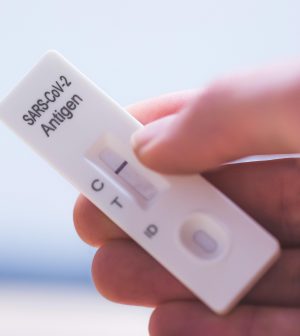- 10 Strategies to Overcome Insomnia
- Could Artificial Sweeteners Be Aging the Brain Faster?
- Techniques for Soothing Your Nervous System
- Does the Water in Your House Smell Funny? Here’s Why
- Can a Daily Dose of Apple Cider Vinegar Actually Aid Weight Loss?
- 6 Health Beverages That Can Actually Spike Your Blood Sugar
- Treatment Options for Social Anxiety Disorder
- Understanding the Connection Between Anxiety and Depression
- How Daily Prunes Can Influence Cholesterol and Inflammation
- When to Take B12 for Better Absorption and Energy
Negative COVID Test May Be Required After 5 Day’s Isolation Among Asymptomatic

MONDAY, Jan. 3, 2022 (HealthDay News) – Right now, Americans who have tested positive for COVID-19 but have no symptoms are advised by the U.S. Centers for Disease Control and Prevention to isolate for five days and then wear a mask for another five days when around others.
But they could soon be asked to also receive a negative antigen test before ending their isolation, Dr. Anthony Fauci said Sunday.
The nation’s top infectious disease expert appeared on national news programs over the weekend, saying that the CDC is considering adding the extra safeguard after getting some “pushback” on its Dec. 27 guidance that shortened isolation times, the Associated Press reported.
“There has been some concern about why we don’t ask people at that five-day period to get tested,” Fauci said. “Looking at it again, there may be an option in that, that testing could be a part of that, and I think we’re going to be hearing more about that in the next day or so from the CDC.”
The Omicron variant is now surging across the country, with about 400,000 new cases daily and increased hospitalizations, the AP reported.
“We are definitely in the middle of a very severe surge and uptick in cases,” Fauci said Sunday. “The acceleration of cases that we’ve seen is really unprecedented, gone well beyond anything we’ve seen before.”
A “fair number” of unvaccinated Americans “are going to get severe disease,” Fauci said, even with accumulating evidence that Omicron may still lead to less severe illness for many of them.
Fauci expressed concern that the variant is overwhelming the health care system and causing a “major disruption” in other essential services.
Among the evidence of that is the grounding more than 2,500 U.S. flights on Sunday and 4,100 worldwide due to the pandemic and wintry weather.
Many office workers who had planned to return in person in early 2022 will continue to work remotely for now, the AP reported. Dozens of colleges have moved their classes online for at least the first week of the semester. Some have warned it could stretch longer if the virus continues to spread rapidly.
“When I say major disruptions, you’re certainly going to see stresses on the system and the system being people with any kind of jobs … particularly with critical jobs to keep society functioning normally,” Fauci said. “We already know that there are reports from fire departments, from police departments in different cities that 10, 20, 25 and sometimes 30% of the people are ill. That’s something that we need to be concerned about, because we want to make sure that we don’t have such an impact on society that there really is a disruption. I hope that doesn’t happen.”
Fauci did offer hope that the country may return to a more normal version of life soon with the right precautions.
“One of the things that we hope for is that this thing will peak after a period of a few weeks and turn around,” Fauci said. He expressed hope that by February or March, Omicron could fall to a low enough level “that it doesn’t disrupt our society, our economy, our way of life.”
Fauci also addressed the question about the sensitivity of rapid at-home COVID tests.
While the U.S. Food and Drug Administration said last week that preliminary research suggests at-home rapid covid tests may have reduced sensitivity when detecting Omicron, the agency is still studying the variant and the tests.
Fauci said Americans “should not get the impression that those tests are not valuable.”
“I think the confusion is that rapid antigen tests have never been as sensitive as the PCR test,” Fauci added. “They’re very good when they are given sequentially. So if you do them like maybe two or three times over a few-day period, at the end of the day, they are as good as the PCR. But as a single test, they are not as sensitive.”
A PCR test looks for the virus’s genetic material, reproducing it millions of times until a computer can detect it. This typically must be done in a lab.
More information
The World Health Organization has more on COVID-19.
SOURCE: Associated Press
Source: HealthDay
Copyright © 2026 HealthDay. All rights reserved.










